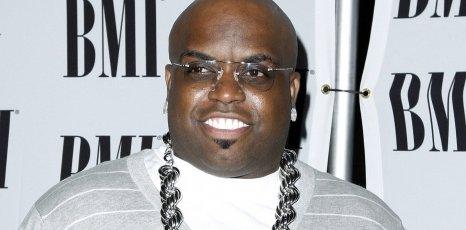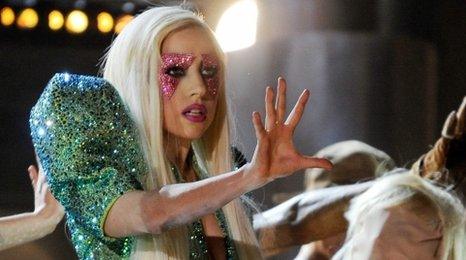Digital albums 'getting cheaper'
- Published

Cee Lo Green says cheap music equals a cheaper 'quality' of music
The price of digital albums is "in sharp decline" but the format's taking a larger slice of the album market.
The average price has come down in the last 12 months to £7.05, according to the Official Charts Company.
"As a result of that there's a bit of a land-grab going on between retailers," says managing director Martin Talbot.
"Sometimes a retailer will take a hit on a product because it's high profile, it'll bring people into store and help them gain a benefit over competitors."
On first glance this sounds like a win-win situation for music fans.
"For the business - it's tougher," explains Talbot. "It changes peoples' perceptions of the value of the product that you're buying.
"If you bought your last seven or eight albums for a fiver you might think twice about going and spending seven or eight pounds on the next one."
One independent record company said on hearing that a new release album from one of their artists could be sold for $3.99 [£2.49] in the US last month, "the work that our artists produce is worth more than a cost of a latte."
"We value the skill, love and time they've put into making their records," they added in an open email.
It was a statement which has opened a debate within the music industry, and raises question like, 'How cheap is too cheap?' and 'Who is losing out here, artist, label, retailer?'
A quick online search shows that some websites are selling new release MP3 albums for as little as £2.99 - a marked change from the £7 or £8 music fans are used to.
'Making a loss'
Indeed, there are rules which surround the price of new release music in order for it to be chart eligible. According to the OCC the minimum dealer price of a new release digital album is £3.75.
With nearly 70 legal online music services in the UK now competing some are now offering albums at rock bottom prices to wrestle customers from market leaders iTunes.
Mflow, who launched in April, are one such service who has offered new release albums from Katy Perry, Brandon Flowers and Manic Street Preachers for £2.99.
"These are promotional prices so we will do one or two albums at that price a week at most," says commercial director Tony Byrne. "We do take a hit and make a loss on this - this is purely a promotion whilst we're trying to gain and grow customers."
Asked whether if the service priced all of their products these keenly it'd be sustainable he said, "Absolutely not."
He added: "We're not setting ourselves up as a discount shop - that's not what we are."
Another UK service pricing new release MP3 albums at a "very competitive" price is Amazon.
They've recently featured artists such as Robbie Williams, Tinie Tempah and Mark Ronson in their 'MP3 album of the week' promotion priced at £3.99.
Julian Monaghan, head of buying for MP3 and music at the company, confirms that they make the decision of which album to promote at that cost.
"It's been really good at bringing in a lot of new customers," he says.
"If you're selling more records that can only be a good thing for the customer and the artist.
"We don't think the artists are [losing out] because we're selling more of their records."
Artists' view
What then the impact on artists and record labels? Financially, nothing.

Tinie Tempah says he doesn't think about the price of his music
If a retailer chooses to buy a new release album at the wholesale price and shrink their profits by selling it cheaply then it is their decision.
But it does open a debate about the value of music and whether artists feel comfortable seeing their creations priced as cheaply "as a latte" without their say-so.
"Music is not only cheap literally but also cheap figuratively," says Cee Lo Green, citing a broader dip in quality.
"The quality of the content is down as well - it's logical to charge less for it."
Tinie Tempah's debut album Disc-Overy was selected as Amazon's 'MP3 album of the week' earlier this month; he says he doesn't think about the price tag placed on his music.
"I'm very aware that music has become a very accessible thing," says Tempah. "We're in a generation where even if you don't want to buy music you can listen to it every single day, an unlimited amount of times for absolutely nothing.
"I'm all about moving with the times."
Jason Derulo can see both sides of the argument.
"Am I surprised? I can't say I'm surprised because of the state of the music industry. It's definitely something that is not cool.
"But maybe the fact that prices are being slashed maybe means music will get to more people. Maybe it's not such a bad thing."
Wiley from chart-topping rap collective Roll Deep represents how a lot of artists feel.
"It's mad, but it is what it is. Yesterday was yesterday. £16.99 for albums? Those days are over."
- Published10 March 2010

- Published1 February 2010
